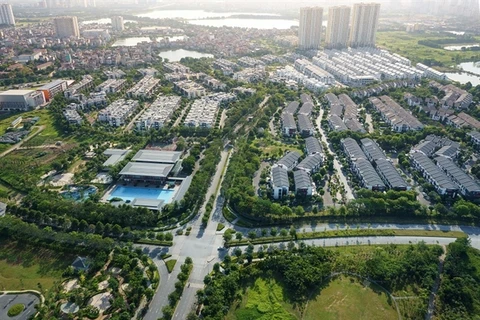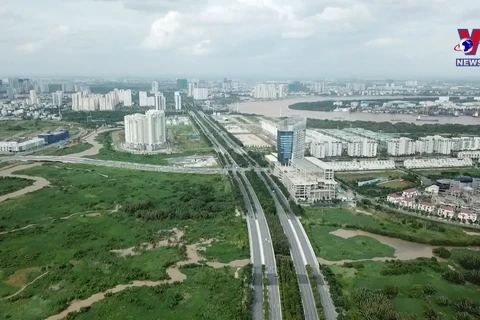Hanoi (VNA) - On August 3, the Ministry of Construction sent a report to the Prime Minister on the implementation of Resolution No. 33/NQ-CP on a number of solutions to overcome obstacles and challenges to ensure the sustainable development of the real estate market.
The report from the Ministry of Construction showed that relevant ministries, sectors, and localities have been focusing on carrying out their assigned tasks.
Deputy Minister of Construction Nguyen Van Sinh said the Ministry of Construction will continue to coordinate with related ministries and sectors in amending a number of laws, such as land and bidding laws, as well as policies and order of procedures.
Regarding institutional and legal improvements, basic obstacles and difficulties related to investment in construction and real estate business under the jurisdiction of the Government, the Prime Minister, and the relevant ministries and sectors have been resolved through the issuance of government decrees and ministries' circulars.
 Legal frameworks, capital sources are among factors hindering real estate projects (Photo: Hung Vo/Vietnam+)
Legal frameworks, capital sources are among factors hindering real estate projects (Photo: Hung Vo/Vietnam+) However, some obstacles and difficulties that fell within the provisions of the Law were being proposed for resolution in the draft laws submitted to the National Assembly for consideration in the near future, such as the draft amended Land Law and the draft amended Housing Law.
Concerning the review and removal of obstacles in real estate projects, the ministry has worked with many localities and received documents and recommendations, addressed the assigned tasks and issued directives to the relevant ministries, sectors, and localities to resolve obstacles and difficulties in the projects.
Regarding the development of social housing and workers' housing, localities have also published lists of projects that met the conditions for banks to implement the VNĐ120 trillion housing credit package with preferential loans.
The ministry will continue to closely coordinate with the State Bank of Việt Nam to provide instructions to localities on effectively implementing the programme to build at least one million homes for low-income and industrial park workers and implement a VNĐ120 trillion credit package.
The country completed 41 social housing projects for low-income people and workers of industrial parks by May 18, 2023 with a supply of about 19,516 apartments. About 294 social housing projects are under construction with a supply of about 288,499 apartments.
 Localities are required to focus on promoting social housing development in the coming time. (Photo: Hung Vo/Vietnam+)
Localities are required to focus on promoting social housing development in the coming time. (Photo: Hung Vo/Vietnam+) Regarding credit resources, the State Bank of Việt Nam has instructed banks to restructure repayment periods for customers and has reduced interest rates several times. As a result, the interest rates for loans have decreased by 0.5 to 2 per cent since the beginning of the year, and the overall interest rate landscape has stabilised.
However, some firms still report that borrowing interest rates remain high, and they encountered difficulties in accessing credit.
Concerning corporate bonds, the Ministry of Finance has issued various directives to ensure that enterprises that have issued bonds concentrate their resources on repayments to protect the interests of investors.
While chairing an online conference to assess the implementation of the Government’s Resolution No33/NQ-CP issued on March 11, 2023, and to propose solutions for the real estate market, Prime Minister Phạm Minh Chinh urged sectors, localities, and enterprises to work together in overcoming obstacles and challenges to ensure the sustainable development of the real estate market.
The Government leader shared his appreciation for the efforts and contributions of all stakeholders in the development of the real estate market. He emphasised that the real estate market experienced both favourable and challenging times. However, the most crucial aspect was to identify emerging issues, difficulties, and obstacles, accurately assess the causes, and propose suitable goals and solutions as well.
The Prime Minister requested all delegates to analyse the implementation of Government’s Resolution No33/NQ-CP and the current real estate market situation, analyse the root causes, and propose tasks and solutions to remove difficulties and obstacles and promote the real estate market, with a focus on issues related to legal frameworks, capital sources, planning, finance, banking, administrative procedures, and decentralisation./.























